Don't wanna be here? Send us removal request.
Text

10 Benefits of Learning Quran for Kids
Introduction:
The Quran is a profound source of guidance and wisdom for Muslims worldwide. Introducing children to the learning of the Quran from an early age can have numerous benefits that shape their character, intellect, and spirituality. This blog will explore ten key benefits of learning the Quran for kids. By fostering a love for the Quran and encouraging its study, we can provide our children with invaluable tools to navigate life's challenges and grow into righteous individuals.
1-Spiritual Nourishment:
Learning the Quran provides children with spiritual nourishment, helping them develop a deep connection with their faith and their Creator, Allah. The Quran's verses contain timeless teachings, instilling in children a sense of awe, reverence, and love for Allah.
2-Moral Development:
The Quran is a comprehensive guide to morality and ethics. By studying the Quran, children learn valuable moral principles such as honesty, kindness, forgiveness, and empathy. These teachings shape their character and lay the foundation for ethical decision-making.
3-Cognitive Development:
The process of learning the Quran involves memorization, recitation, and understanding of its verses. These activities stimulate cognitive development, improving memory retention, concentration, and critical thinking skills. Quranic studies also enhance linguistic abilities, vocabulary, and reading comprehension.
4-Emotional Intelligence:
The Quran addresses a wide range of human emotions and experiences, offering guidance on how to manage them effectively. By studying the Quran, children learn to recognize and regulate their emotions, developing emotional intelligence and empathy towards others.
5-Language Proficiency:
The Quran is written in classical Arabic, a rich and eloquent language. By learning the Quran, children improve their Arabic language skills, including pronunciation, grammar, and vocabulary. This linguistic foundation opens doors to understanding other Arabic texts and deepening their knowledge of Islamic literature.
6-Increased Focus and Concentration:
The memorization and recitation of the Quran require focused attention. Regular engagement with the Quran trains children to concentrate for extended periods, enhancing their ability to focus on other academic or personal tasks.
7-Connection to Islamic Heritage:
Learning the Quran allows children to connect with their Islamic heritage. They gain insight into the history, stories, and lessons of past prophets and civilizations. This connection fosters a sense of pride in their identity and a stronger bond with the global Muslim community.
8-Strengthening Family Bonds:
Engaging in Quranic studies can become a shared activity within the family. Parents and siblings can support and learn alongside the child, creating a nurturing environment that strengthens family bonds and fosters a love for the Quran as a collective experience.
9-Guidance in Times of Difficulty:
The Quran offers solace and guidance during challenging times. When children face obstacles or uncertainties, the Quranic teachings provide comfort and direction, offering solutions and inspiring resilience.
10-Lifelong Source of Blessings:
By instilling a love for the Quran in children, we equip them with a lifelong source of blessings. The knowledge and devotion to the Quran acquired in childhood continue to benefit them as they grow, enabling them to seek guidance and blessings from its verses throughout their lives.
How can we help you learn and understand the messages Quran?
Aalim learning app provides an individual online madrasa program. We also help students and adults to learn Quran and Islamic studies in your preferred languages at your convenient time.
Our online quran learning program helped hundreds of students globally, Al hamdu lillah. Besides learning quran online we teach Arabic, Islamic studies, Tajweed, Duas , History, Fiqhe, Quranic Arabic and Meaning of Quran.
How are classes for kids?
For students Unlike conventional group online madrasa classes, we are providing individual online madrasa classes so that we can ensure high personal attention.
How are classes for adults?
For adults, we provide video lessons and track progress via personal interactions so that adults can learn at their own preferred time and speed.
0 notes
Text

17 Great Lessons From the History of Prophets Ibrahim (Peace be upon him).
Prophet Ibrahim is widely regarded as one of the most important figures in Islamic history. His life is filled with lessons that can inspire and guide us in our own lives. Let’s discover important lessons from the life of Prophet Ibrahim (Peace be upon him) that continue to inspire people of faith worldwide.
Ibrahim's (a)story teaches us about faith, resilience, and trust in Allah. Despite facing challenges, he never lost faith and remained devoted to the truth. In this blog, we explore the valuable lessons we can learn from Prophet Ibrahim's life and how they can impact our own spiritual journey and personal growth.
Lesson 1-Allah will test us throughout our lives. We already studied that this life is a test from Allah. So we have to expect different tests from Allah throughout our lives.
Lesson 2-Allah tests those he loves. The more tests you undergo, you will be closer to Allah. Allah had tested Ibrahim (Peace be upon him) many times and called him Khaleelullah, the friend of Allah. Allah may test us many times, but we shouldn’t lose our faith in him.
Lesson 3-We should correct others, even if they are our close blood relatives. Ibrahim (Peace be upon him) even corrected his father when he worshipped idols.
Lesson 4-We should have strong faith in Allah during difficult times. People decided to burn Ibrahim (Peace be upon him) alive, but he had strong faith in Allah.
Lesson 5-Whenever Allah helps us, we should thank Him. When Allah saved Ibrahim (Peace be upon him) from fire, he thanked Allah.
Lesson 6-When we love Allah and obey his commandments, Allah will raise our status in both worlds. As Ibrahim (Peace be upon him) followed all the commandments of Allah, Allah gave him the highest status in both worlds.
Lesson 7-We should stand for the truth even if our parents do wrong.
Lesson 8-We should always debate with others to prove the truth. Throughout the life of Ibrahim (Peace be upon him), we can see the debates that he had to prove the truth.
Lesson 9-We should obey the commandments of Allah. Whether we like it or not, if Allah has commanded, we must obey. That was the biggest lesson we learned from the history of Ibrahim (Peace be upon him).
Lesson 10-We should help our parents in good ways and not support them in bad ways. In this history, we can see that Ismail (Peace be upon him) helped his father build the Kaaba, which is a good thing. But Ibrahim (Peace be upon him) didn’t support his father in creating the idols.
Lesson 11-Never lose hope; Allah will give. Ibrahim (Peace be upon him) had no children till his old age. But Allah gifted him with two great sons at his old age. He didn’t lose hope.
Lesson 12-We should pray to Allah alone during these difficult times. When Hajar was alone, she prayed to Allah for water, and Allah blessed her with water that flows continuously even today.
Lesson 13-Along with praying to Allah, we should work our hardest. Hajar prayed to Allah for water, and along with that, she searched for it running between the hills Swafa and Marwa. She tried her best. Finally, Allah provided water.
Lesson 14-Allah tests those whom he loves the most. Ibrahim (Peace be upon him) was tested by Allah multiple times. He always won his tests, and thus Allah called him Allah’s friend, Khaleelullah, and honoured him. Still, every Muslim remembers him daily.
Lesson 15-We can see many people in our families without children. Such people should learn lessons from the life of Ibrahim (Peace be upon him) and pray to Allah without losing hope.
Lesson 16-From the story, we can understand that Allah can do whatever he wishes. Usually, it is not possible to have a baby at an older age. But here Allah blesses Ibrahim (Peace be upon him) and Sarah in their old age.
Lesson 17- We can understand from the history of Ibrahim (Peace be upon him) and Ismail (Peace be upon him) that they prayed to Allah for accepting the deed of building the holy Kaaba. Similarly, we should also pray to Allah for the acceptance of our good deeds.
Embrace the inspiring lessons from the story of Prophet Ibrahim (Peace be upon him) and let them fuel your desire to learn the Quran. Discover its profound wisdom, find solace in its verses, and allow it to shape your character and strengthen your connection with Allah. Start your journey of Quranic learning today.
Would you like to teach the history of prophets to your kids?
We will teach the history of all prophets to children through our interactive live classes. We can also help you learn and understand Quran.
Aalim Learning app provides an individual online madrasa program. We also help students and adults to learn Quran and Islamic studies in your preferred languages at your convenient time.
0 notes
Text

25 Good deeds to be done during Dhul Hijjah
Dhul Hijjah is a sacred month filled with immense opportunities for Muslims to earn abundant rewards and draw closer to Allah. While Hajj holds great significance during this time, there are numerous acts one can engage in to maximize blessings. This blog post provides 25 actionable points to make the most of Dhul Hijjah, with a focus on learning the Quran.
1-Reflect on Quranic verses daily.
2-Learn the interpretation (Tafsir) of the Quran.
3-Set achievable Dhul Hijjah goals.
4-Increase daily Quran recitation.
5-Recite Surah Al-Fatiha with reflection.
6-Memorize a new Surah.
7-Attend Quranic workshops or webinars.
8-Teach Quranic verses to others.
9-Reflect on the stories of the Prophet Ibraheem (a).
10-Implement Quranic teachings in daily life.
11-Engage in night prayers (Tahajjud).
12-Seek knowledge about the Quranic sciences.
13-Host a Quranic circle.
14-Recite the Quran with proper Tajweed (recitation rules).
15-Utilize technology: Download Quran apps for easy access.
16-Perform Sunnah and Nafl prayers.
17-Give voluntary charity generously.
18-Observe fasting on the day of Arafa.
19-Seek forgiveness abundantly.
20-Make sincere supplications (Duas) for oneself and others.
21-Sacrifice animal.
22-Recite different adhkars.
23-Set intention to perform Hajj.
24-Spend more time in Masjid.
25-Attend fajr salah in the masjid and sit till sunrise and perform dhuha prayer after 15 minutes of sunrise. So that you will get the reward of Haj and Umra as per the hadith of prophet Muhammed (s).
Conclusion:
Dhul Hijjah is a time of spiritual growth and immense rewards. By incorporating these 25 actions into your routine, with a focus on learning the Quran and implementing its teachings, you can make the most of this blessed month. May Allah bless you abundantly and accept you
Would you like to teach the importance of Dhul hijjah to your kids?
We will teach the importance of this blessed month to children through our interactive live classes. We can also help you learn and understand Quran.
Aalim Learning app provides an individual online madrasa program. We also help students and adults to learn Quran and Islamic studies in their preferred languages at your convenient time.
0 notes
Text

Importance of Dhul Hijjah in Islam
The month of Dhul Hijjah is a sacred period in the Islamic calendar that offers abundant rewards and blessings for Muslims who dedicate themselves to acts of worship, reflection, and devotion. It is a time when believers from all corners of the globe engage in acts of piety, seeking closeness to Allah and striving for spiritual growth. In this blog, we will explore the manifold rewards that await those who make the most of the month of Dhul Hijjah.
The Blessed Ten Days:
The first ten days of Dhul Hijjah are among the most blessed days of the year. The Prophet Muhammad (peace be upon him) declared, "There are no days in which righteous deeds are more beloved to Allah than these ten days." Engaging in acts of worship during this period, such as prayer, fasting, remembrance of Allah, and recitation of the Quran, brings immense rewards and blessings.
The Rewards of Hajj:
Performing Hajj, the fifth pillar of Islam, during the month of Dhul Hijjah is a journey of a lifetime that holds unparalleled rewards. Pilgrims who embark on this spiritual expedition with sincerity and adherence to the prescribed rituals earn the forgiveness of their past sins and have their supplications answered by Allah. The Prophet Muhammad (peace be upon him) stated, "The reward for an accepted Hajj is nothing but Paradise."
Fasting on the Day of Arafah:
Fasting on the 9th day of Dhul Hijjah, known as the Day of Arafah, carries immense rewards. The Prophet Muhammad (peace be upon him) said, "Fasting the Day of Arafah expiates the sins of the previous year and the coming year." Muslims who are not performing Hajj are encouraged to observe this fast as a means of attaining forgiveness and drawing closer to Allah.
The Virtue of Sacrifice:
Eid al-Adha, the Festival of Sacrifice, marks the culmination of the month of Dhul Hijjah. It is a time when Muslims worldwide offer animal sacrifices as an act of obedience and devotion to Allah. The rewards for this act of worship are vast, as it symbolizes one's willingness to make sacrifices for the sake of Allah and signifies unity with the legacy of Prophet Ibrahim (Abraham).
Acts of Charity and Kindness:
The month of Dhul Hijjah emphasizes acts of charity and kindness towards others. Muslims are encouraged to give in charity, support the needy, and demonstrate generosity in various forms. The Prophet Muhammad (peace be upon him) said, "Never does a Muslim give in charity during the days of Dhul Hijjah with the intention of seeking Allah's pleasure except that Allah records for them a reward similar to that of a martyr."
The Virtues of Takbeer:
Reciting the Takbeer (declaration of the greatness of Allah) during the first ten days of Dhul Hijjah is highly recommended. Uttering phrases such as "Allahu Akbar, Al Hamdu Lillah, La ilaha illallah and sub hanallah brings immense rewards and serves as a means of glorifying and remembering Allah during this blessed period.
Increased Acts of Worship:
The month of Dhul Hijjah provides a prime opportunity for Muslims to increase their acts of worship. Engaging in additional prayers, supplications, and Quranic recitation during this period brings multiplied rewards. Devoting time to reflect upon the Quran and seek Allah's guidance fosters spiritual growth and a deeper connection with the divine.
Seeking Forgiveness and Repentance:
Dhul Hijjah is a time for sincere repentance and seeking forgiveness from Allah. By acknowledging our shortcomings, seeking His forgiveness, and resolving to rectify our behavior, we open the doors to His mercy and forgiveness. Allah is the Most Forgiving and is ever ready to accept the repentance of His servants.
Would you like to teach the importance of Dhul hijjah to your kids?
We will teach the importance of this blessed month to children through our interactive live classes. We can also help you learn and understand Quran.
Aalim Learning app provides an individual online madrasa program. We also help students and adults to learn Quran and Islamic studies in their preferred languages at your convenient time.
For more details
Call or WhatsApp +91 9961 932 932
You can click this link to chat with us,
Join Whatsapp Group Now
You can join our WhatsApp group where we will share many informative contents.
" required>
The month of Dhul Hijjah is a sacred period in the Islamic calendar that offers abundant rewards and blessings for Muslims who dedicate themselves to acts of worship, reflection, and devotion. It is a time when believers from all corners of the globe engage in acts of piety, seeking closeness to Allah and striving for spiritual growth. In this blog, we will explore the manifold rewards that await those who make the most of the month of Dhul Hijjah.
The Blessed Ten Days:
The first ten days of Dhul Hijjah are among the most blessed days of the year. The Prophet Muhammad (peace be upon him) declared, "There are no days in which righteous deeds are more beloved to Allah than these ten days." Engaging in acts of worship during this period, such as prayer, fasting, remembrance of Allah, and recitation of the Quran, brings immense rewards and blessings.
The Rewards of Hajj:
Performing Hajj, the fifth pillar of Islam, during the month of Dhul Hijjah is a journey of a lifetime that holds unparalleled rewards. Pilgrims who embark on this spiritual expedition with sincerity and adherence to the prescribed rituals earn the forgiveness of their past sins and have their supplications answered by Allah. The Prophet Muhammad (peace be upon him) stated, "The reward for an accepted Hajj is nothing but Paradise."
Fasting on the Day of Arafah:
Fasting on the 9th day of Dhul Hijjah, known as the Day of Arafah, carries immense rewards. The Prophet Muhammad (peace be upon him) said, "Fasting the Day of Arafah expiates the sins of the previous year and the coming year." Muslims who are not performing Hajj are encouraged to observe this fast as a means of attaining forgiveness and drawing closer to Allah.
The Virtue of Sacrifice:
Eid al-Adha, the Festival of Sacrifice, marks the culmination of the month of Dhul Hijjah. It is a time when Muslims worldwide offer animal sacrifices as an act of obedience and devotion to Allah. The rewards for this act of worship are vast, as it symbolizes one's willingness to make sacrifices for the sake of Allah and signifies unity with the legacy of Prophet Ibrahim (Abraham).
Acts of Charity and Kindness:
The month of Dhul Hijjah emphasizes acts of charity and kindness towards others. Muslims are encouraged to give in charity, support the needy, and demonstrate generosity in various forms. The Prophet Muhammad (peace be upon him) said, "Never does a Muslim give in charity during the days of Dhul Hijjah with the intention of seeking Allah's pleasure except that Allah records for them a reward similar to that of a martyr."
The Virtues of Takbeer:
Reciting the Takbeer (declaration of the greatness of Allah) during the first ten days of Dhul Hijjah is highly recommended. Uttering phrases such as "Allahu Akbar, Al Hamdu Lillah, La ilaha illallah and sub hanallah brings immense rewards and serves as a means of glorifying and remembering Allah during this blessed period.
Increased Acts of Worship:
The month of Dhul Hijjah provides a prime opportunity for Muslims to increase their acts of worship. Engaging in additional prayers, supplications, and Quranic recitation during this period brings multiplied rewards. Devoting time to reflect upon the Quran and seek Allah's guidance fosters spiritual growth and a deeper connection with the divine.
Seeking Forgiveness and Repentance:
Dhul Hijjah is a time for sincere repentance and seeking forgiveness from Allah. By acknowledging our shortcomings, seeking His forgiveness, and resolving to rectify our behavior, we open the doors to His mercy and forgiveness. Allah is the Most Forgiving and is ever ready to accept the repentance of His servants.
Would you like to teach the importance of Dhul hijjah to your kids?
We will teach the importance of this blessed month to children through our interactive live classes. We can also help you learn and understand Quran.
Aalim Learning app provides an individual online madrasa program. We also help students and adults to learn Quran and Islamic studies in their preferred languages at your convenient time.
0 notes
Text

WHAT ARE THE SIX ARTICLES OF FAITH IN ISLAM?
Every Muslim must adhere to and uphold the six Articles of Faith, which are the fundamental principles of Islam. The foundation of Islam is comprised of these tenets of belief, which embody the central messages of the Quran and the Prophet Muhammad (PBUH). The Six Articles of Faith are covered comprehensively in this blog article.
Six Articles of Faith are:
Belief in Allah
Belief in angels
Belief in holy books
Belief in the prophets
Belief in the Day of Judgement and the afterlife
Belief in divine decree (Qadr)
Now let’s discuss these articles of faith in detail.
Belief in Allah
The fundamental Islamic belief that there is only one God, Allah, is known as tawhid. We Muslims hold that the world and everything in it were created by Allah. We also hold the belief that Allah is merciful, all-knowing, and all powerful. Muslims must venerate Allah alone and not equate Him with any other beings.
2. Belief in Angels
Angels are one of the creations of Allah, who are sinless and obey all the commandments of Allah without any questions. We human beings are created from mud, but angels are created from light. Allah has given different duties for the angels. All angels will always obey Allah and perform their duties in the perfect way. Among men, there are good and bad men, but among angels, there are no bad angels. All of them are good; they always obey Allah, worship Allah, and praise Allah. Moreover, we can't see angels, but angels can see us. So, believing in the existence of this kind of a creation of Allah is obligatory for all Muslims.
3. Belief in Holy books
We Muslims believe that Allah sent different prophets to different parts of the world. All the prophets preached to people to worship Allah alone. Allah has given some books to selected prophets. These books are the guide for men. Allah gave the Quran to our beloved Prophet Muhammed (s).
The following are some of the books given to prophets.
Thorahath - Musa (a)
Zaboor - Davood (a)
Injeel -Isa (a)
Quran - Muhammed (s)
We Muslims believe in all the above holy books. But, currently, these books are not available in their original text. Only the Quran is available as revealed by Allah, and this Quran is the last and final revelation to mankind.
4. Believe in prophets of Allah
Allah has sent different prophets to mankind to teach them about Allah. All prophets teach people to worship Allah alone.
Allah sent thousands of prophets, but only 25 prophets' names are mentioned in the Quran.
The following are some of the prophets among those 25:
Adam (a)
Nooh (a)
Swalih (a)
Looth (a)
Davood (a)
Sulaiman (a)
Ibraheem (a)
Ismail (a)
Musa (a)
Esa (a)
Muhammed (s)
So, being Muslims, we should believe and respect all the prophets. That is a part of our faith.
Also, we believe that Prophet Muhammed (s) is the last and final prophet, and there is no more prophet to come after him.
5. Belief in the Day of Judgement and the afterlife
We should believe that there will be a day of judgement, and on that day, Allah will question all the human beings who have lived in this world from the first born to the last born. On that day, if we have done more good deeds, Allah will give us Jannah, and if we have done more bad deeds, Allah will give us Hell. So we should always be careful to obey and follow the commandments of Allah and live as per the teachings of the prophet Muhammad (s). May Allah unite us in Jannah.
6. Belief in Qadr (divine decree)
Qadr (divine decree) means the will of Allah. We Muslims believe that the divine decree (Qadr) controls the outcome of all actions in this universe. Allah has knowledge of everything, past, present, and future, and that everything happens according to His will. This means that Allah has already predetermined all good and bad deeds in our lives. As a result, we should not curse or blame Allah for anything bad that has happened in our lives.
So, believing in all these six articles of faith is obligatory for every Muslim to affirm in the religion. These articles of faith provide a framework for Muslims to understand their purpose in life and guide them towards the path of righteousness and worship of Allah.
Importance of learning and understanding 6 articles of faith
We should also convey the importance of believing these articles of faith to the growing generations. It will definitely help them succeed in both worlds. It is the foundation of Islamic education. We will help you to give your kids Islamic education and guide them to a straight path.
We will also ensure that they understood the concept and have designed our curriculum in a way that students can practice what they have learned.
How can we help you learn and understand the messages Quran?
Aalim learning app provides an individual online madrasa program. We also help students and adults to learn Quran and Islamic studies in your preferred languages at your convenient time.
Our online quran learning program helped hundreds of students globally, Al hamdu lillah. Besides learning quran online we teach Arabic, Islamic studies, Tajweed, Duas , History, Fiqhe, Quranic Arabic and Meaning of Quran.
How are classes for kids?
For students Unlike conventional group online madrasa classes, we are providing individual online madrasa classes so that we can ensure high personal attention.
How are classes for adults?
For adults we provide video lessons and track progress via personal interactions so that adults can learn at their own preferred time and speed.
0 notes
Text

7 EASY STEPS TO LEARN QURAN
Are you searching for an easy way to learn the Qur'an easily?
You are at the right place.
We are glad to help you.
There are millions of muslims in this world, but only few know how to read the Quran with proper tajweed. Most people think that learning the Quran with Tajweed is a very difficult task. But even though you are a non-arab, it is very easy to Learn Quran with proper tajweed and read it perfectly.
Do you know that the Quran is the only book that promises reward for reading it?
Yes, Allah promises ten rewards for every letter recited. A letter is Alif, a letter is Laam, a letter is Meem, and so on.
Additionally, there are two rewards offered for beginners who have trouble reading it.
We all need to Learn Quran perfectly, because they are the words of Allah.
It is mandatory for all Muslims to and live accordingly.
In order to Learn Quran in its perfect way, it is crucial to have a basic knowledge of the Arabic language.
These 7 steps will help you to Learn the Quran easily by learning Arabic in its most easy way.
In Sha Allah.
Let's move onto the steps to learn this amazing book.
Step 1
Consult a tajweed teacher
Learning the Quran is a skillful task. It needs sincere effort and practice. It is difficult to learn proper tajweed without the guidance of a teacher, since there are a lot of rules to understand. A tajweed tutor can assist you in learning the correct way to recite the Quran and in correcting any faults you are currently making. You can consult a tajweed teacher nearby your place to help you to Learn Quran in its perfect way. They can help you Learn Quran easily.
If that is not available, don’t be upset; We are glad to tell you that we are having tajweed teachers who will help you to understand tajweed and guide you in learning the Quran in a perfect way in your convenient time and language. You can gather more details about this,
Step 2
Learn Arabic Alphabets with correct pronunciation
Arabic Alphabets must be learned in their proper pronunciation before beginning to Learn Quran. Knowing the Makraj (origin) of Alphabets will help you in perfecting the pronunciation. The Arabic language is entirely different from all other languages in the world, because it is much easier to learn, and at the same time it needs proper guidance to ensure perfect pronunciation. You can learn it with the help of our videos.
Step 3
Learn 3 forms of each alphabet
When writing a word, the Arabic alphabet appears in three different forms. A letter can be written in three distinct ways: at the beginning, in the middle, and at the end. Before starting to Learn Quran and read Arabic words, it is crucial to understand these forms. It is simpler to read words after learning these forms.
Step 4
Learn 20 situations of the each alphabet
Next you have to learn 20 situations for each alphabet: Fathha, kesra, Damma, Madd, shadd and so on. It is very important to learn these before trying to start reading Arabic words. This is one of the basic steps to Learn Quran in an easy way. If you make this done, you are almost done in learning the Quran to read.
Step 5
Practice reading simple Arabic words
If you have done till step 4 you are almost done in learning the Quran to read. Now you can start the next easy step to Learn Quran, you can start reading simple Arabic words. It is very easy to learn Arabic.it is easier to Learn Quran. Regular practice benefits you to improve your reading skills. The more you practise, the more you become fluent. Our Arabic pronunciation book will help you to explore words in the Quran that will speed up your reading. This book is prepared including the words in the Quran and it benefits you to get familiarise with Quranic words.
Step 6
Start Reading Quran
Now you are almost done!!
You can start reading the Quran from the small chapters now. It is better to start with the Surahs that you are not byhearted.
I suggest you play audios of the Quran recitation by great scholars while learning to read the Quran. This will help you to Learn Quran without mistakes and make you understand if there are any mistakes and moreover, it helps you improve your tone of recitation.
Step 7
Learn Tajweed Rules
We already said reciting the Quran is a skill. It has a set of rules in reading each word of the Quran in its correct pronunciation called Tajweed.
They include Noon sakinah, Idh’har, Iqlab, ikhfaa and so on. Solearning tajweed is an important part of learning the Quran. It is only possible to Learn Quran with perfect tajweed with the help of an expert tajweed teacher.
Learning the Quran and reading it is a type of skill that requires constant practice. You must regularly spend at least 30 minutes on this.
We are ready to help you if you want to learn more about Tajweed and the Quran. Aalim learning app provides an individual online madrasa program for students and we also teach Quran and Islamic studies for adults in your preferred languages at a time that is convenient for you.
0 notes
Text
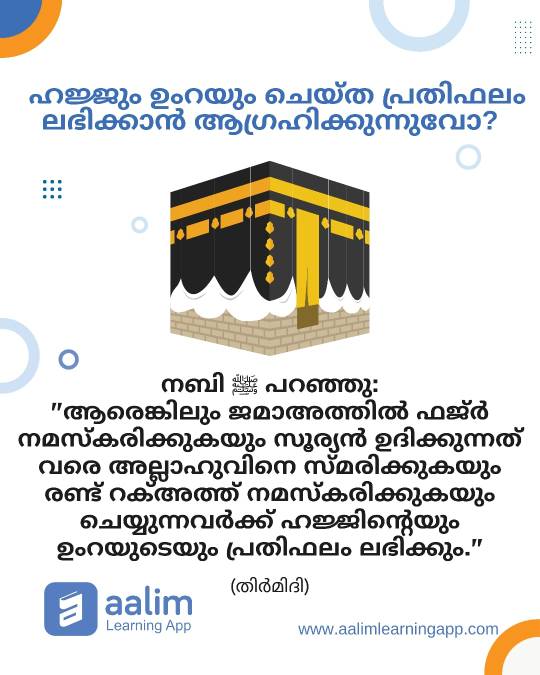
ഹജ്ജും ഉംറയും ചെയ്ത പ്രതിഫലം ലഭിക്കാൻ ആഗ്രഹിക്കുന്നുവോ?
For Any Enquiries 📞099619 32932 🌐https://www.aalimlearningapp.com/
. . #aalimlearning #aalimapp #aalimlearningapp #onlinemadrasakerala #onlinequranlearning #learnarabic #QuranOnline #quranonlineclasses #studyquran #onlinemadrasamalayalam #onlinemadrasakerala #OnlineQuranClasses
0 notes
Text
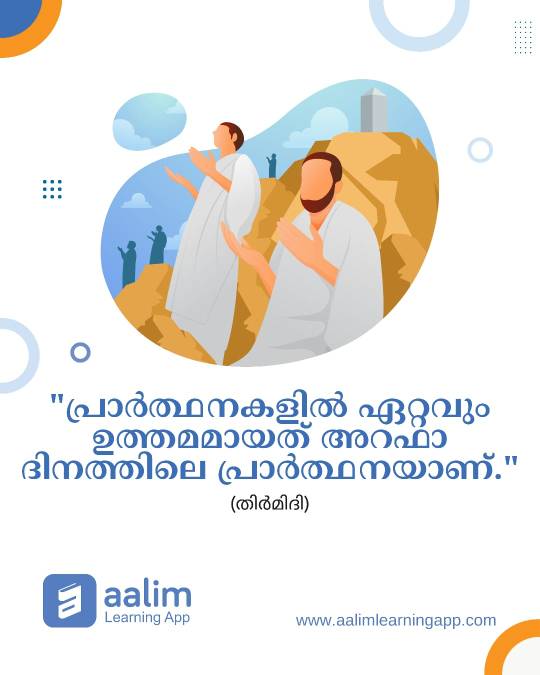
"പ്രാർത്ഥനകളിൽ ഏറ്റവും ഉത്തമമായത് അറഫാ ദിനത്തിലെ പ്രാർത്ഥനയാണ്." . . . . #aalimlearning #aalimapp #aalimlearningapp #onlinemadrasakerala #onlinequranlearning #learnarabic #learnarabiconline #LearnQuranOnline #khatmulQuran #QuranOnline#quranonlineclasses #studyquran #onlinemadrasamalayalam#onlinemadrasakerala #OnlineQuranClasses
0 notes
Text
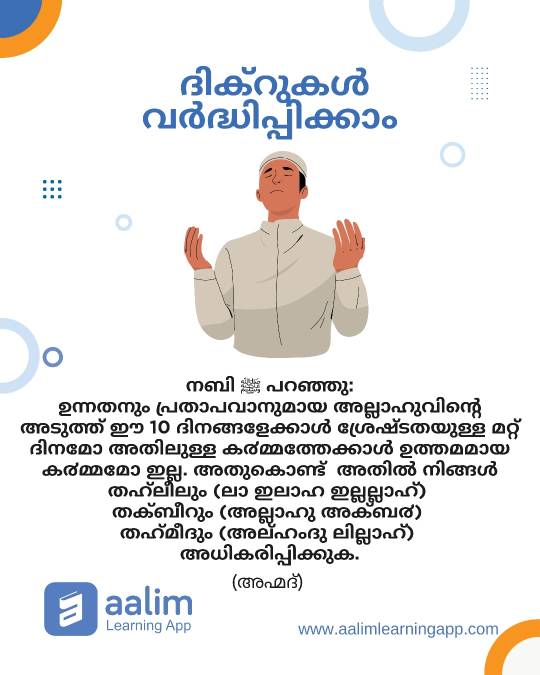
ദിക്റുകൾ വർദ്ധിപ്പിക്കാം
#aalimlearningapp #aalim #aalimlearning #Quran #QuranOnline #quranquotes #quranrecitation
0 notes
Text

Anti Tobacco Day
tobaccoday31may #AntiTobaccoDay #aalimapp #aalimlearning #aalimlearnigapp #May31
0 notes
Text
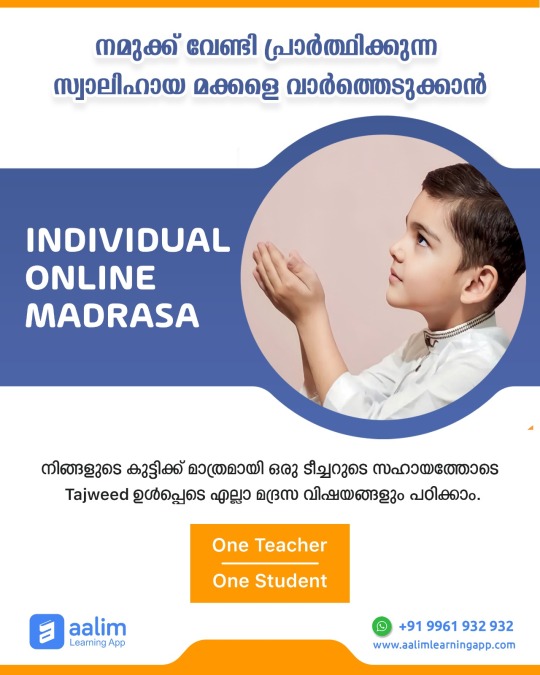
INDIVIDUAL ONLINE MADRASA
📔നിങ്ങളുടെ കുട്ടിക്ക് മാത്രമായി ഒരു ടീച്ചറുടെ സഹായത്തോടെ Tajweed ഉൾപ്പെടെ എല്ലാ മദ്രസ വിഷയങ്ങളും പഠിക്കാം.
📲For more details plz send a WhatsApp message by clicking here.
🌐 https://www.aalimlearningapp.com/
.
.
.
#aalimlearning #aalimapp #aalimlearningapp #OnlineMadrasa #IslamicStudy #MadrasaEducation #education #individualonlineclasses
0 notes
Text
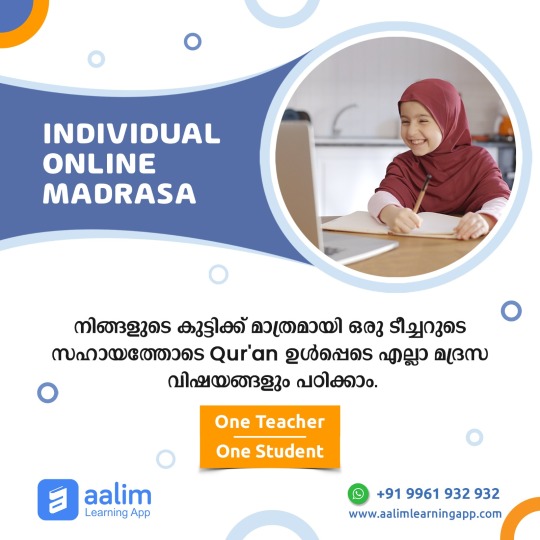
📔കുട്ടികളുടെ മദ്രസ പഠനത്തെക്കുറിച്ച് വിഷമിക്കേണ്ട.
🕋നിങ്ങളുടെ കുട്ടിക്ക് മാത്രമായി ഒരു ടീച്ചറുടെ സഹായത്തോടെ ഖുർആൻ ഉൾപ്പെടെ എല്ലാ മദ്രസ വിഷങ്ങളും പഠിക്കാം.
📚Subjects 1-Arabic Reading 2-Qur'an Hifz 3-Tajweed Rules 4-Khathmul Qur'an 5-Duas with Meaning 6-Islamic Studies 7- Meaning of Qur'an 8-Arabic Language
📲For more details plz send a WhatsApp message by clicking here. https://wa.link/4w3cfc 🌐 https://www.aalimlearningapp.com/ . . .
aalimlearning #aalimapp #aalimlearningapp #OnlineMadrasa #IslamicStudy #MadrasaEducation #education #individualonlineclass
0 notes
Text
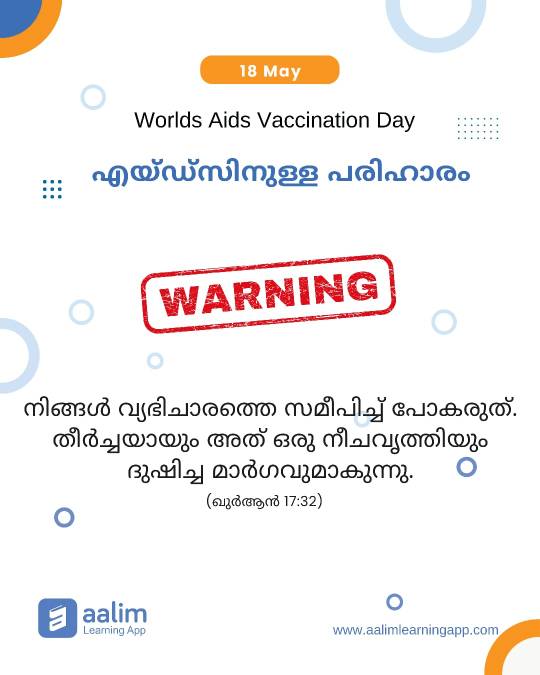
Worlds Aids Vaccination Day . . . #aalimlearning #aalimapp #aalimlearningapp #aidsvaccine #WorldAidsVaccineDay #May18th
0 notes
Text
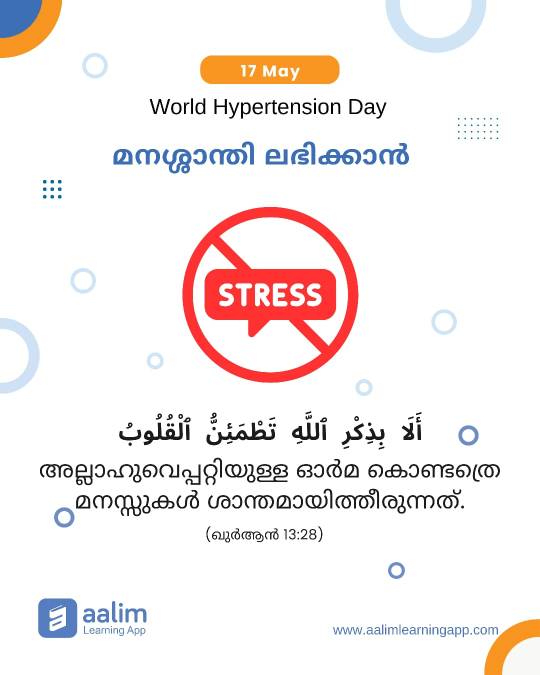
World Hypertension Day
hypertensionday #aalimlearning #aalimapp #aalimlearningapp #hypertension #WorldHypertensionDay
0 notes
Text
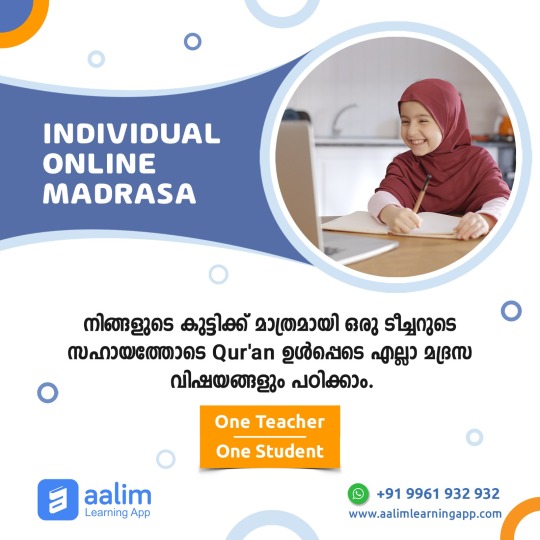
🙋♂️ Individual Online Madrasa
🕢Engaging personal live classes at your convenient time.
📚 Subjects: Quran, Tajweed, Arabic, Islamic Studies, Duas, Meaning of Quran etc.
🗒️Admission for kids and teens.
👇For more details.
Click the link below 🪀https://wa.link/obbpiv
📞+91 9961 932 932
📲Please share with your friends & relatives
🌐www.aalimlearningapp.com . . . .
aalimlearning #aalimapp #aalimlearningapp #Quran #onlineeducation #OnlineMadrasa #education #MadrasaEducation #QuranTranslation
0 notes
Text
0 notes
